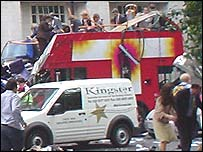Untitled Document

THOUSANDS of investors joined sharp institutions in making millions of pounds
from the short-lived collapse in share prices that followed the terrorist strikes
in London last week.
It was the busiest day of trading for over two years. The London Stock Exchange
said 4.75 billion shares were traded on Thursday compared with the recent daily
average of about 3.1 billion.
BP and Vodafone were among Britain's largest companies that took advantage of
the volatile markets to improve their balance sheets.
Financial spread-betting firm City Index said more than 8000 retail investors
had dived into the market on Thursday, correctly backing their hunch that share
prices would quickly bounce back.
Some will find profiteering from horror distasteful. But many in the City applauded
the resilience of capitalism.
The opportunity was created by automatic trading systems, used by institutional
investors, that began dumping stock when shares fell sharply as news of the
blasts spread through the City. At one point the UK benchmark stock index, the
FTSE 100, had lost 100 points in two minutes and at its lowest was showing a
4 per cent fall.
"Despite the awful news, there were a considerable amount of people trading
and making a lot of money," said City Index chief executive Clive Cooke.
"We were deluged with buyers, it was absolute mayhem. In this electronic
age, instead of being shell-shocked, investors got straight on to their PCs
and took the opportunity to make money."
"We haven't had such a busy day since March 2003, just before the Iraq
war," said Ian Jenkins, head of spreadbetting at Cantor Fitzgerald.
The trading firm also reported unusually heavy volumes on its fixed-income
floor on Thursday morning as many institutional investors fled from equities
to lower-risk assets.
Private investors were buying financial instruments that allowed them to take
a leverage position either in the index itself or in leading shares. Investors
had been sitting on their hands, concerned the stock market was too high with
the FTSE 100 rising to about 5200 on Wednesday.
BP and Vodafone, two of Britain's largest companies, took advantage of the
sudden slump in the value of their shares. BP bought in 7.4 million shares,
some for as little as 601 1/2 pence. This was close to the intra-day low that
its shares hit as the market plummeted around 10.30 on Thursday morning.
On the day of the bombs, BP bought about twice as many of its own shares as
its average daily purchase over the past four weeks.
Vodafone also took advantage of the weakness in its share price, spending pound
stg. 74 million ($173 million) to buy in 55 million shares at prices around
135p. Only the previous day, it had bought in millions of shares at prices close
to 139p.

